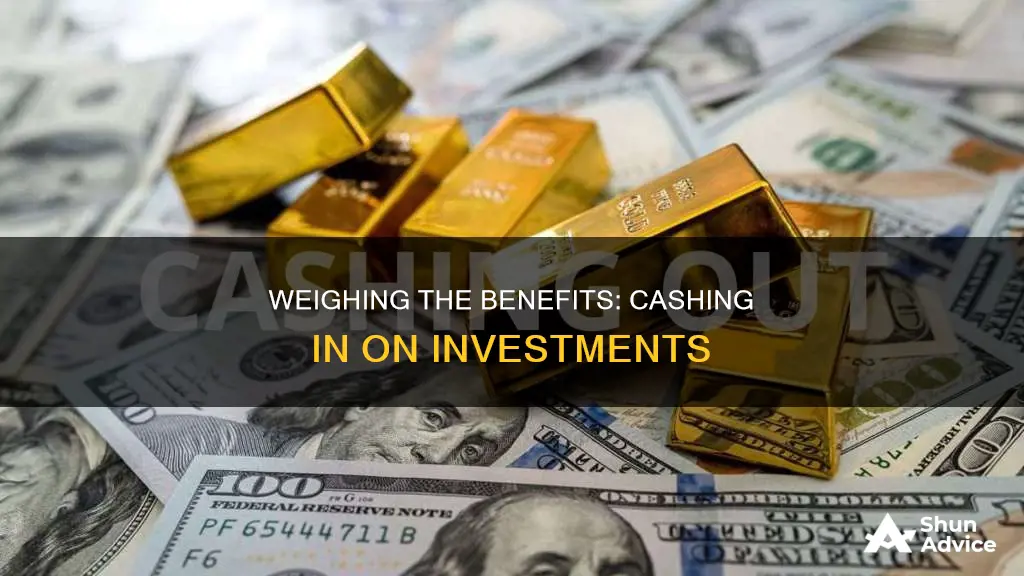
When stock markets become volatile, investors may be tempted to cash in their investments. While holding or moving to cash might feel good mentally and help avoid short-term stock market volatility, it is unlikely to be a wise strategy over the long term. Cash doesn't grow in value and its purchasing power is eroded over time by inflation. Therefore, if you cash out a stock that has dropped in price, you move from a paper loss to an actual loss.
However, there are some benefits to holding cash. Cash is psychologically soothing and can help you avoid further losses when the stock market is in free fall. Financial advisors often recommend having at least six months' income in cash to cover any unexpected expenses.
So, should you cash in your investments? Well, that depends on your individual circumstances, goals, approach to risk, and investment timeframe.
| Characteristics | Values |
|---|---|
| Cash is psychologically soothing | During troubled times, you can see and touch it. |
| Cash is not risk-free | Inflation can eat into its value over time. |
| Cash is good for short-term goals | It is good for goals within the next five years. |
| Cash is good for emergency funds | It is recommended to have at least six months' income in cash for emergencies. |
| Cash is good for peace of mind | It can give you peace of mind that your capital will be preserved. |
| Cash is good for planned expenses | It is good for expenses planned in the next five years. |
What You'll Learn

Cashing out can be a defensive move in a volatile market
However, cashing out is unlikely to be a wise strategy over the long term. While it may help you avoid short-term stock market volatility, cash does not grow in value. In fact, inflation erodes its purchasing power over time. This means that by cashing out, you are locking in your losses.
For example, if the rate of inflation is 5% over one year, and you have £10,000 earning 1%, your money will be worth only £9,600 at the end of the year—a loss of £400. Thus, cash is no defence against inflation.
Additionally, by cashing out, you may miss out on the explosive, unexpected start of rallies. Rallies are sudden and unexpected, and investors who have cashed out tend to miss out on the best market days, which often follow the worst days.
Therefore, rather than cashing out, consider rebalancing your holdings during downtimes. While holding cash can help you avoid further losses when the stock market is in free fall, it is unlikely to be a good strategy over the long term.
Pension Plans: Cash, Investments, and Your Retirement Future
You may want to see also

Cash is a reliable safety net for unexpected costs
Cash is a reliable safety net that can help you prepare for unexpected expenses. Financial experts recommend setting aside at least $1,000 for emergencies and then building up to cover three to six months' worth of living expenses. This safety net can provide peace of mind and help you manage large, unexpected costs, such as car repairs or home maintenance.
Having accessible cash can be especially important during periods of financial stress or market volatility. It can serve as a "cash cushion" to fall back on, allowing you to avoid selling investments at an inopportune time and locking in losses.
Additionally, cash can be psychologically soothing during uncertain times. It provides a sense of security and control, as you can physically see and touch it. This tangible aspect of cash can be comforting when dealing with volatile markets or unpredictable situations.
While cash may not grow in value, it is a stable asset that can protect you from the systematic risk associated with stock market investments. By holding cash, you avoid the potential losses that come with market downturns and protect yourself from inflation, which erodes the purchasing power of your money over time.
However, it is essential to consider the opportunity cost of holding cash. Over the long term, cash deposits may not keep up with inflation, resulting in a loss of value in real terms. Therefore, it is crucial to balance your cash holdings with other investments to ensure your money works hardest for you.
Transferring Cash to Fidelity Investments: A Step-by-Step Guide
You may want to see also

Inflation erodes the value of cash over time
For example, if you have £100 and the inflation rate is 10% over the next year, the nominal value of your money will still be £100 at the end of the year. However, due to inflation, you would need to spend £110 to buy the same goods and services that £100 would have bought you a year earlier. This means that your original £100 is worth 10% less than it was a year ago.
Inflation occurs when there is a rise in demand, a reduction in supply, or a combination of both. For instance, when consumer demand for goods and services increases while supply remains limited, inflation tends to increase. Inflation can also be caused by disruptions in the supply chain or when an item is very popular and quickly sells out.
Central banks, such as the US Federal Reserve and the Bank of England, use monetary policy tools to manage inflation. They may increase interest rates, alter reserve requirements, or change the money supply to curb inflation.
While holding cash can be psychologically soothing, especially during volatile markets, it is unlikely to be a wise strategy over the long term. Cash does not grow in value and its purchasing power is eroded by inflation. Therefore, holding cash over the long term is a sure way of losing money in real terms.
Attracting Cash Investments: Strategies to Engage Shareholders
You may want to see also

Cash can be a better option for short-term savings goals
Financial advisers often recommend keeping at least six months' income in savings accounts for quick access in case of emergencies. This ensures that you have a safety net to fall back on when unexpected costs arise. It is also a good idea to keep some cash set aside for investment opportunities in the stock market.
Cash savings are reliable and serve two purposes: emergency funds and planned expenses within the next five years. For emergency funds, it is best to use easy-access savings accounts, which allow unlimited withdrawals but typically offer lower interest rates. In contrast, fixed-term accounts offer higher interest rates but restrict withdrawals until the term ends.
While investing in the stock market may offer higher returns, it is a long-term strategy. Historical data shows that the stock market has outperformed cash savings over time. However, it is important to remember that the market can be volatile, and there is always the risk of losing money.
If you are unsure about your investment options, it is recommended to seek independent financial advice.
Positive Cash Flows: A Smart Investment Strategy?
You may want to see also

Cash savings can be a good option for risk-averse investors
Cash savings are reliable and serve two main purposes: emergency funds and savings for short-term goals. It is important to have a safety net for unexpected costs, such as surprise expenses or income loss. Additionally, cash savings can be used for planned expenses within the next five years, as it provides flexibility and access to funds without the risk of selling investments during a market downturn.
While cash savings may not provide high returns compared to investments, they can protect against systematic risk and provide psychological comfort during volatile market conditions. However, it is essential to consider the impact of inflation, as it can erode the purchasing power of cash over time. To mitigate this, investors should aim for savings accounts with competitive interest rates that can help offset the effects of inflation.
Overall, cash savings can be a prudent choice for risk-averse investors, providing stability, liquidity, and peace of mind. However, it is crucial to balance cash savings with investments to optimize returns and maintain purchasing power in the long term.
Preventing Cash Crunch in Illiquid Investments: Strategies for Success
You may want to see also
Frequently asked questions
Holding cash can help you avoid further losses when the stock market is in free fall. Cash is also psychologically soothing as you can see and touch it, and it will still be there in the morning.
Cash doesn't grow in value and its purchasing power is eroded over time by inflation. If you cash out after the market tanks, you will have bought high and sold low, which is the opposite of a good investment strategy.
Opportunity cost is the benefits an individual misses out on when choosing one alternative over another. In the case of cash, you need to compare the growth of your cash portfolio, which will be negative over the long term, against the potential gains in the stock market.
There is no easy answer to this question. Rallies are sudden and unexpected, and investors rarely, if ever, get out of the market at the right time.







